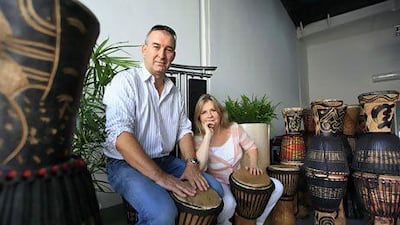A full moon desert drumming event might seem a long shot for a man interested in offshore oil and gas surveying, but 52-year-old Guy Odell took it in his stride.
His wife, Julie Ann, says he has always supported her and this was no different.
"He is the power behind the throne," says Mrs Odell, 55, who founded Dubai Drums in 2002.
Mrs Odell is among a number of business owners who has found that employing her spouse has actually spurred the company along. A division of labour and mutual respect are the cornerstones of such partnerships.
"Many women who trust their husbands would trust them with their business," says Michelle Hunter, a business psychologist and lecturer at Heriot-Watt University in Dubai.
Four years after Mrs Odell started her drumming business, her husband was in between jobs and came on board as general manager for a year. A month ago, he quit his full-time job to join her "because the business has grown significantly", he says.
Back in 2006, he implemented an online management system that involved putting in place a calendar, sorting out invoices and an inventory of drums. He also introduced a company manual. Now he negotiates with client, while Mrs Odell takes care of the creative side of the business.
A key to the success of such a relationship is the delegation of work by distributing power.
"The entire set-up, whereby the male is the employee and the female is the employer may at first defy the logic of the conjugal roles that women and men are expected to play," Ms Hunter says.
For Anna Batchelder, the owner and chief educational officer at Bon Education, her husband, Chris, is a friend and an entrepreneur. While she is good at designing educational technology programmes, he excels at business development and negotiations. This also helps to ensure an efficient work flow. For instance, Mr Batchelder plays to his strengths by writing the initial business proposal and she edits it.
Mr Batchelder, the company's president and creative director, joined his wife's company in 2010, a year after it opened. Bon Education now works with private companies as well as the Ministry of Education.
The couple, both 31, say communication skills are the most important element in such a relationship.
"We do not always have the same opinion. We praise each other's work but we have to be critical, too," Mrs Batchelder says.
To find a work-life balance, the couple ensure they have different hobbies and read different books.
And when Mr Batchelder rides his bikes, his wife practises yoga.
Yet that does not mean there are no disagreements in such relationships, Mrs Odell says.
"We have great fun and great fights together," she says.
Most of the time, Mrs Odell says she resisted policies her husband introduced, such as having an accounting book.
And sometimes, he felt that Mrs Odell was bossing him around. "I think he liked me wearing the feminine love-of-his-life hat rather than the bossy woman one," she says.
Men who do quit their full-time jobs to work for their wives usually do so to grow the company.
Ambareen Musa, 33, started Souqalmal.com, the rate comparison website, in July last year. Although her husband, Tom de Waele, a 32-year-old consultant at Bain & Company, helps her, he will not join her company until it has grown enough to support their family.
"One big reason is that the start-up world already requires a lot of sacrifice and investment. And it takes a load off if one of the couple actually works and brings in the cash to support the family until the business is well established," Ms Musa says.
The business that Mrs Odell started with two people has swelled to 50 events a month and employs eight people besides the couple. She has also incorporated a leadership and consulting business.
Mrs Odell says her husband is "chief troubleshooting officer", although they have yet to settle on an official title.
"If I have no one to drive the truck at 6am, or if I need to take care of sound equipment, he is there," she says.

